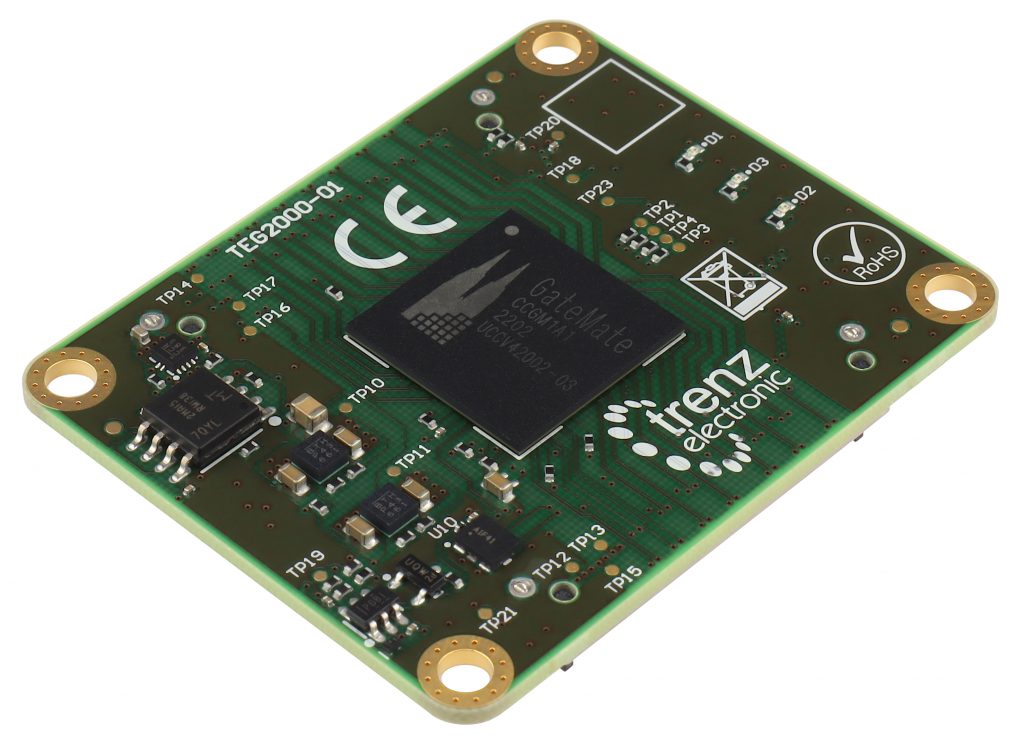GateMate uniqueID™ and End of Life challenges
We have created a new Flyer regarding the topics “Are your experiencing challenges due to the End of Life (EoL) of your legacy FPGAs?” and “GateMate uniqueID: Design copy protection”.
We have created a new Flyer regarding the topics “Are your experiencing challenges due to the End of Life (EoL) of your legacy FPGAs?” and “GateMate uniqueID: Design copy protection”.
Cologne: Trenz Electronic, a trailblazer in FPGA-based solutions, introduces its latest product, an FPGA Module equipped with the cost-effective GateMate A1 from Cologne Chip AG. The module sets a new standard for low-cost programmable logic devices, providing an affordable yet powerful solution for diverse applications. Trenz Electronic can manufacture and assembly different variants in-house.
Key Features of Trenz Electronic’s FPGA Module:

Cologne, 11.07.2023: Cologne Chip AG and TES Electronic Solutions GmbH are pleased to announce their new cooperation in the field of IP design blocks on Cologne Chip’s low-cost, low-power and user-friendly GateMate FPGA family. The two companies will work together to offer their customers one-stop-shop FPGA solutions for many embedded applications such as in industrial, automotive and telecoms markets. TES Electronic Solutions is a leading provider of hardware IP building blocks and systems, while Cologne Chips is the only European vendor of FPGA’s. The cooperation between the two companies will combine their expertise and resources to create cutting-edge solutions that will benefit customers in various industries.
“We are excited to partner with TES Electronic Solutions to bring our GateMate FPGAs to leading industry customers,” said Dr. Michael Gude, CEO, Cologne Chip AG.
“We are thrilled to work with Cologne Chips to create innovative solutions based on Cologne Chip’s unique GateMate FPGAs. Our highly experienced ASIC/FPGA Design House is ready to support turn-key developments around the world.” said Jürgen Zeller, CEO, TES Electronic Solutions.
About Cologne Chip AG:
Cologne Chip was founded in 1995 and became the leading provider of ISDN IC solutions. With this knowledge they announced their innovative, low-cost, low-power and user-friendly Gatemate FPGA family in 2020. Their Goal is to offer a Made In Germany competitive FPGA solution.
About Gatemate FPGA Family:
The GateMate FPGA family addresses all application requirements of small to medium size FPGAs. Logic capacity, power consumption, package size and PCB compatibility are best in class and yet available at lowes cost of ownership. Cologne Chip AG hence drives FPGA usage towards many applications, which previously used discrete or software programmable solutions. All this is based on a novel FPGA architecture combining CPE programmable elements with a smart routing engine. The devices are manufactured using Globalfoundries™ 28 nm SLP (Super Low Power) process. Due to manufacturing in Europe, there is no danger of trade restrictions or high taxation.
About TES Electronic Solutions GmbH:
TES Electronic Solutions GmbH is an innovative technology and design services company offering intellectual properties (IP), embedded hard- and software for a vast range of customers in global markets, such as in industrial, automotive, consumer electronics, as well as in semiconductors. Key capabilities include embedded software, graphics, RF & antenna, radar, mixed-signal and digital ASIC and FPGA designs.
It is not only particles that are accelerated here, but also careers: As a major research centre near Geneva, CERN is a top international address for physical findings. At this renowned facility, Richard Jung was the first student from Dortmund University of Applied Sciences and Arts to have the chance to crown the practical part of his Master’s thesis with his own experiments.
We are happy to announce that Cologne Chip is part of IPCEI ME/CT with 30 other companies in Germany. The German companies will invest more than 10 billion Euro in Production facilities, manufacturing plants and for the development of semiconductor chips. They are totally funded with 4 billion Euro, 70% will be provided by the German federal government and 30% by the federal states. This program will strengthen the European Semiconductor industry and our vision for an innovative next generation of FPGAs with AI accelerator.
We have just released our University Program to give Students and Researches an easy access to our GateMate FPGA family with outstanding support and open-source development Tools. This will be an excellent opportunity to start with development of new ideas with an open-source driven FPGA. Please visit our University Program site https://www.colognechip.com/programmable-logic/university-program/ for further information.
Machdyne announced development of a new board “Kölsch” based on the latest GateMate FPGA A1 chip. With its Simplicity, cost effectiveness and advanced process node (Global Foundries SLP 28nm) of GateMate FPGA A1 fit very well in the open-source community. The new Board will expand their portfolio with powerfull and easy entry FPGA.
About Machdyne
Machdyne is developing series of small general-purpose computers, modules and tools designed to operate and remain useful for decades. Their focus is on supporting timeless applications (reading, writing, math, education, organization, communication, automation, etc.) with simple, secure, responsive, reliable and repairable hardware. They run their own store in order to share their progress and to give developers and early adopters advance access to their hand-assembled prototypes.
Olimex announced development of new OSHW board based on the latest GateMate FPGA A1 chip. With its Simplicity, cost effectiveness and advanced process node (Global Foundries SLP 28nm) of GateMate FPGA A1 fit very well in the open-source community. With the new OSHW board, Cologne Chip and Olimex will offer a new vehicle for wide range of applications.
About Olimex
Olimex Ltd. is a company that specializes in the design and manufacturing of open-source hardware and development tools. They are based in Plovdiv, Bulgaria, and have been operating since 1991. Olimex focuses on producing development boards, single-board computers (SBCs), embedded systems, and various hardware components.
You are currently viewing a placeholder content from X. To access the actual content, click the button below. Please note that doing so will share data with third-party providers.
More Information